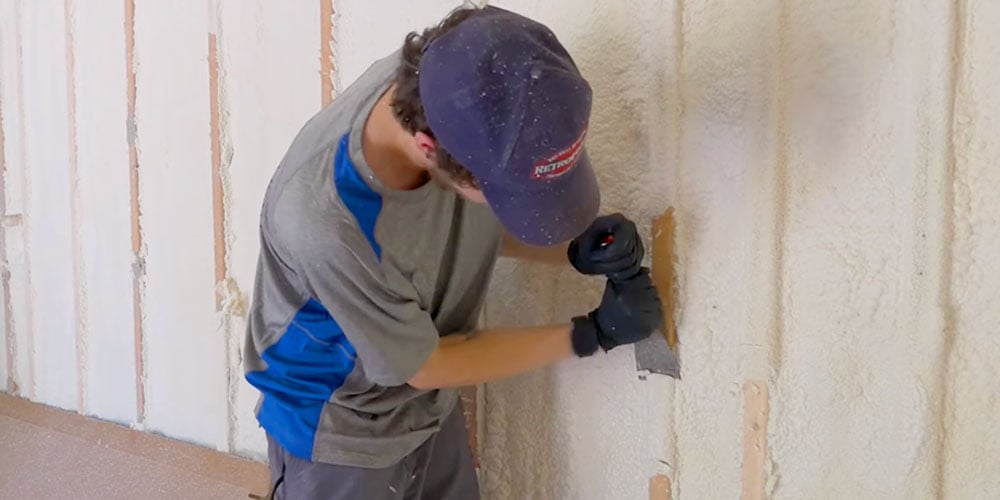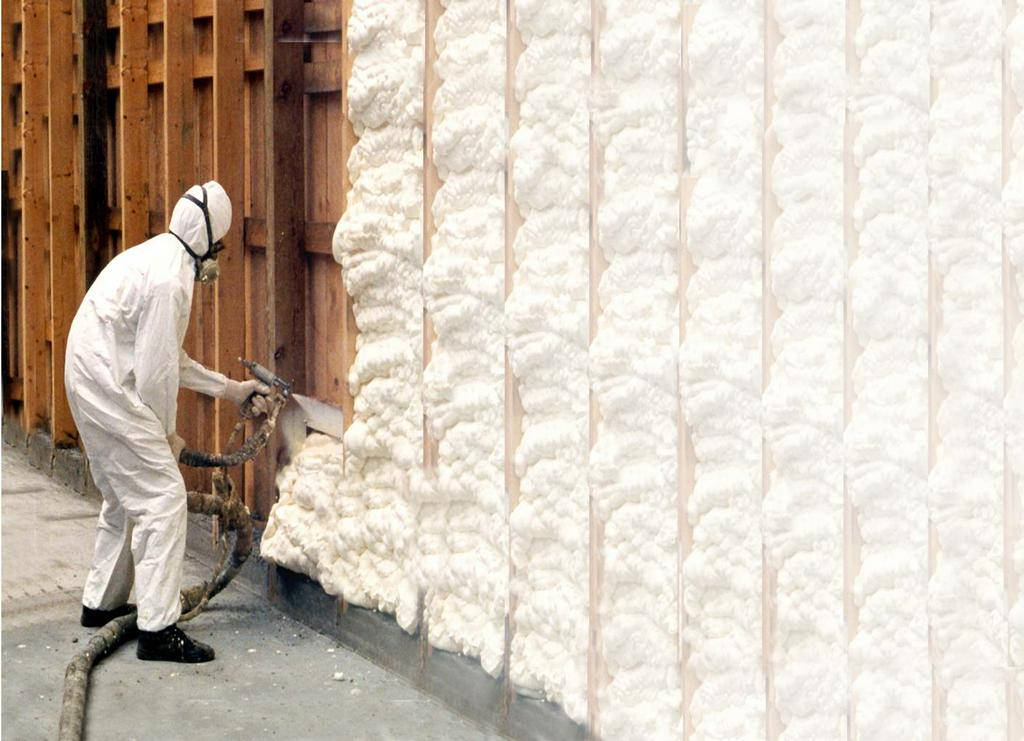Selecting the Right Type of Spray Foam for Your Insulation Demands
Selecting the Right Type of Spray Foam for Your Insulation Demands
Blog Article
Leading Factors to Select Spray Foam for Your Following Insulation Task
When thinking about insulation options for your next task, spray foam stands out due to its excellent performance characteristics and effectiveness advantages. As you weigh your choices, exploring the versatile applications and lasting benefits of spray foam might reveal engaging reasons to incorporate it into your insulation approach.
Superior Insulation Performance

The high R-value of spray foam, which measures its thermal resistance, is an additional crucial advantage. Closed-cell spray foam, as an example, can achieve an R-value of up to 6.5 per inch, substantially outmatching fiberglass batts and cellulose. Furthermore, spray foam insulation creates an airtight seal, which lessens thermal connecting and minimizes the capacity for mold and mildew development due to moisture buildup.

Power Effectiveness Perks
The power efficiency benefits of spray foam insulation are significant, more enhancing its appeal as a leading choice for constructing insulation. Among the key benefits is its exceptional thermal performance. Spray foam broadens upon application, developing a closed seal that decreases air leakages, which is a typical source of energy loss in traditional insulation materials. By effectively lowering thermal connecting, it maintains a constant interior temperature, thereby lowering heating & cooling prices.
In addition, spray foam insulation flaunts a high R-value per inch, which means it offers more thermal resistance in less space compared to alternatives like fiberglass or cellulose (Spray Foam). This effectiveness not just adds to prompt power savings yet likewise promotes long-term sustainability by minimizing the general power intake of a structure
In addition, the implementation of spray foam can certify house owners for power effectiveness rewards and tax credits, adding monetary advantages to its energy-saving capacities. In a period where power conservation is critical, choosing spray foam insulation not just boosts comfort yet additionally aligns with eco accountable techniques, making it a prudent selection for both domestic and business jobs.
Moisture and Mold And Mildew Resistance
Provided its special structure and application technique, spray foam insulation uses phenomenal dampness and mold and mildew resistance, making it a perfect choice for different environments. The closed-cell structure of spray foam creates a strong obstacle that effectively seals prospective moisture access, thus reducing the likelihood of mold and mildew development. Unlike standard insulation products, which can absorb water and offer a breeding place for mold, spray foam stays unsusceptible wetness, boosting the overall health of the indoor setting.
Additionally, the application procedure of spray foam involves broadening and filling cracks and gaps, making certain a limited seal that reduces air leaks. This characteristic not only enhances energy efficiency yet likewise helps control moisture degrees within the space. Proper humidity control is crucial for protecting against mold and mold, making spray foam insulation particularly beneficial in locations prone to wetness, such as basements and crawl spaces.
Along with its moisture-resistant buildings, spray foam is additionally inherently resistant to mold and mildew development. This particular makes certain that homes and structures continue to be healthy and risk-free with time, offering assurance to homeowners and structure supervisors alike.
Long-Term Price Cost Savings
Buying spray foam insulation returns significant long-term cost financial savings, largely with improved power effectiveness. Unlike conventional insulation materials, spray foam develops an airtight seal that lessens air leak. This reduction in drafts causes lower cooling and heating expenses, as cooling and heating systems do not need to work as difficult to preserve comfortable indoor temperature levels.
Furthermore, the superior shielding residential or commercial properties of spray foam mean that homes continue to be consistently comfortable year-round, minimizing dependence on energy-consuming appliances. With time, these savings can collect, resulting in a visible reduction in energy costs.
Furthermore, spray foam insulation adds to the long life of your home's structure by stopping wetness buildup and mold and mildew development, which can result in pricey fixings. With its durability and resistance to working out, spray foam keeps its efficiency throughout the years, making sure that the preliminary financial investment continues to repay.
In essence, selecting spray foam insulation not only improves your home's energy effectiveness yet likewise translates into significant long-lasting economic advantages, making it a wise financial investment for homeowners seeking to reduce prices while boosting comfort and sustainability.
Versatile Application Alternatives
Numerous application alternatives make spray foam insulation an extremely functional choice for a selection of building tasks (Spray Foam). This flexibility allows it to be effectively used in domestic, commercial, and industrial setups, providing to diverse insulation demands
Spray foam can be applied in attics, wall surfaces, crawl rooms, and also roofs, supplying seamless protection that removes gaps and spaces where air leaks typically take place. Its capacity to broaden upon application ensures a tight seal, which is essential for energy efficiency and dampness control.
In addition, spray foam insulation is offered in different solutions, consisting of open-cell and closed-cell types, allowing for tailored services based on certain task demands. Open-cell foam is click here to find out more lighter and better fit for soundproofing, while closed-cell foam provides premium insulation and structural stability, making it optimal for locations exposed to wetness.
Furthermore, spray foam can be applied in hard-to-reach spaces, enhancing its suitability for retrofitting existing structures. With the capability to abide by numerous substrates, including concrete, metal, and timber, spray foam insulation stands out as a flexible choice that satisfies the needs of modern-day building practices.
Conclusion
In final thought, spray foam insulation arises as a superior alternative for insulation tasks due to its phenomenal thermal resistance, power performance, and capability to create closed seals that protect against moisture and mold here and mildew development. Picking spray foam insulation guarantees a comprehensive remedy that satisfies the needs of modern-day building and construction and power efficiency criteria.
When it comes to achieving optimal power performance in commercial and property buildings, spray foam insulation stands out for its superior insulation performance.The energy effectiveness advantages of spray foam insulation are considerable, further improving its appeal as a top selection for building insulation.Investing in spray foam insulation returns considerable long-term expense financial savings, mainly with boosted energy efficiency.In final thought, spray foam insulation emerges as a superior choice for insulation projects due to its remarkable thermal resistance, energy effectiveness, and capability to produce airtight seals that protect against moisture and mold growth. Choosing spray foam insulation ensures a thorough solution that fulfills the needs of modern-day building see it here and power performance criteria.
Report this page